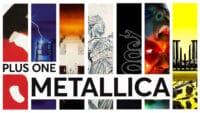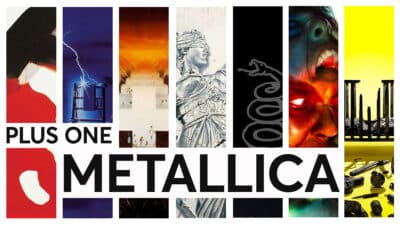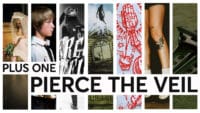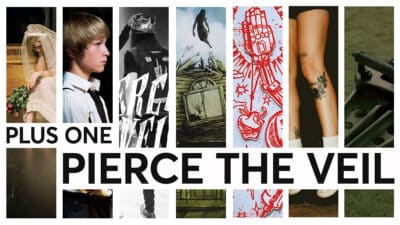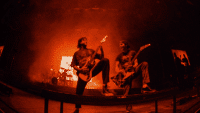Music
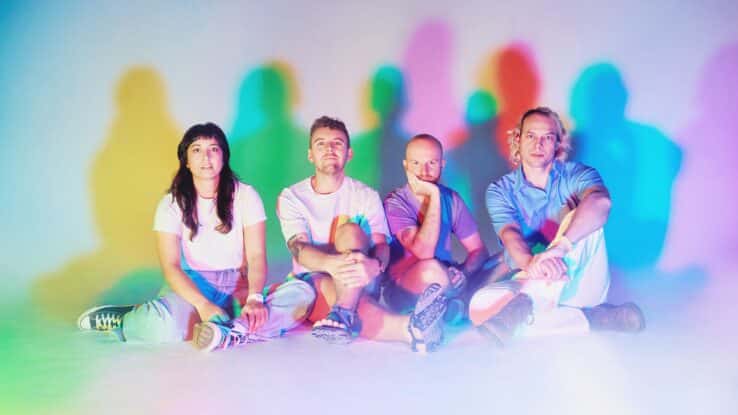
“My compass was recalibrating” – The Beths’ Liz Stokes & Jonathan Pierce on making Straight Line Was A Lie
The loveable New Zealand indie-rockers on the making of their best album yet
“There’s that thing where if you’re lost in the wilderness or something you try and walk in a straight line, you’ll end up walking in a big circle,” reflects Liz Stokes, the frontperson of Auckland’s loveable indie-rockers The Beths. “It’s hard for the metaphor to not be depressing, because going in a circle does sound fruitless, but I think it’s not. Life isn’t something that you try and get out of, right? It’s something that you are just always moving through; sometimes you move through in a circular way, and sometimes you go what feels like backwards, but you’ve never been going backwards. You’re always going forwards through time.”
Direction is recurring a theme of Stokes’ writing, under the jangly guitars and layered harmonies The Beths bacame known for even before their 2018 debut Future Me Hates Me. On ‘2am’, the wistful closing track of 2022’s Expert In a Dying Field, Stokes sings of a time when she stared “straight ahead the whole time”. But while as a band The Beths trajectory has continued to propel forwards in the years since, having recently played some of their biggest headline shows, Stokes own personal course was thrown into flux. A dual blow of a Graves disease diagnosis and the numbing side-effect of an SSRI anti-depressive medication meant that for the first time, she was struggling to write songs.
Alongside her bandmate and partner Jonathan Pearce, Stokes worked on a new angle of tapping into her creativity, forcing herself to write 10 pages of whatever came to mind and retreating to LA to indulge in the expanse of culture available, be that Japanese cinema or an Olivia Rodrigo concert. Out of the fruits of what resulted back with their bandmates in northern New Zealand came Straight Line Was A Lie, The Beths’ fourth full-length album – their most emotionally dynamic and packed with some of the best songs they’ve written yet.
As the band hit the UK to tour the new album, we sat down with Liz and Jon to delve more into the making of Straight Line Was A Lie.
Liz, you’ve talked about dealing with a “new brain” when coming to write Straight Line Was A Lie. How did you deal with that feeling when creative output is integral to your career?
Liz: I guess when we talk about it, when I talk about it interviews, it’s always through the lens of songwriting as an end goal or something. But that wasn’t the main goal. I was really in a hard place mentally and physically, and they were kind of tied together with a Graves disease diagnosis and just all this stuff that was compounding and it was me taking steps to try and help myself out of this place. So I started therapy, and then started an SSRI and it was so eye opening and really helpful, particularly the first few months where I was just like, Oh my gosh, I’ve never experienced having a brain that’s not absolutely working against itself and fighting everything, with the anxious voice in my head making everything really difficult, I guess. Experiencing that quiet was so helpful, and then helpful to get back on my feet, back to building routines to find a normality again.
Once I found that it was like well, what’s missing is that I haven’t really been able to write. A lot of my writing’s emotional and instinctual, and I just feel like I’m pointing in a direction and – I keep using this metaphor because it feels right – but it’s like the my compass was recalibrating, and I couldn’t tell which direction I was going. It was hard to follow my instincts and write instinctually when I kind of didn’t have strong instincts. So as a way through that we did what we do, which is try and work with it, and we made a system where I was like, I’ll try writing just like stream of consciousness.
So I did that for six weeks, 10 pages a day. That was really good for looking at and approaching things in my brain that I didn’t normally like to look at and maybe I wouldn’t have been able to look at if I wasn’t feeling stable and quite quite strong. And so that was step one, and then I ended up weening off the SSRI after being on it for about a year and a half. Like a lot of people find, it’s it’s a long journey with SSRIs, it’s not usually like you take one and then you’re fixed. It’s got this kind of ongoing maintenance, and there’s going off it and then maybe going on it again if things kind of become hard. But yeah, I was finding myself a bit numb towards the end part of it, and I feel like I had built some kind of structure that I was ready to try going without it for a while, and that was as I was starting to kind of write the music. And so that all kind of happened around that time.
Lyrically, the album is marked by some lower ebbs of loneliness or apathy, but often musically this is turned on its head quite euphorically. Jon, what’s the process of treating something so delicate with dignity whilst making it explosive and cathartic?
Jon: Liz will have made something. She would have made a demo, an explainer of what the song is and that’s often quite a beautiful little artifact in its own way. It’s not a Beths song at that point, because we’re reasonably dedicated to the band process, and, and we love band music, but it really is often quite a beautiful, viable little piece of music. And so what the process is really like for us is trying to come to terms with the fact that we have to make it worse in order to make it better We kind of have to assert ourselves in ways that might be uncomfortable, that might feel like they aren’t respectful of the song’s direction in order to discover other places that it can go.
The song ‘Straight Line Was A Lie’ was a song where we toiled the least over it in that way and I think, I think we had really clear ideas of where that song was going, but it’s also just intentionally as simple as it can possibly be. It’s direct repetition. There are no problems to solve from a from a band playing point of view, there’s no tricky dynamic shifts or anything. So that song was one of the exceptions that proves the rule, where it’s remarkable to us because of how easy it did come together. Just about the first time we played it as a band was a few hours before we recorded it, not quite we had sort of touched on it before we recorded it a little bit back home, but when we were doing our little Retreat Session in the north of New Zealand, where we had set up a recording studio in someone’s lounge at a beach in Northland, we kind of took ourselves into a side room of the house and played it through with acoustic instruments a few times and kind of learned it and we sort of thought, oh, maybe this will come together.
And then it just came together. We played it loud a few times, and felt pretty good about it, so we started recording takes and it ended up coming out pretty easy. But then there were other ones, like ‘Mosquitoes’. Obviously, there are still bits of that song that are quite, quite acoustic and intimate, and putting anything over that felt pretty bad initially. And then some things we we tried to assert ourselves on ‘Mother, pray for me’, and that didn’t really work, unsurprisingly, but we had to test it.
Liz: We have quite a nice band arrangement of that, and with all these things, it’s a balance, right?
When did the relief of coming through the other side happen, was that after LA when you had a notebook of songs or more when they’d had the band treatment back in New Zealand?
Liz: It was nice to come home with that big batch of songs. At that point I had done all of the the pulling from my brain, and then I had done all the writing. There’s still the hard thing – it is a hard thing for us to, to put it through The Beths machine and change it from the demo into what becomes The Beths song; it’s a painful process for me, because something that’s been just mine for so long becomes part of the band, but it’s something that I’m committed to because I love bands. All the artists that I love, they often have solo projects and band projects and often I love the band project, there’s something about it. So you do have to kind of go through the process of letting go. But by the time I’ve brought it to the band, I’ve come to terms with things that are on it. But then I say that, and then we do a lot of interviews and I have to kind of re-confront because I have to explain myself to a jury of journalists the decisions that I’ve made.
Liz, talking about the song Mother, Pray For Me with The Guardian you said it “made what I’m feeling able to be understood by people like me, rather than by people like my mum.” I think you’ve long had a doting, zealous fanbase and you touch something quite emotional with them at live shows – does that help you to make peace with things like this that might not’ve been solved within the song itself?
Liz: Yeah, absolutely. It feels like part of why I’m writing songs is because I want to feel like I’m understood by both myself and by other people. I’m not making art for myself in a vacuum, I’m looking at myself like, is this okay? You know, pulling something out and being like, is this okay? Anyone else? So it’s very gratifying when we start to be able to play the songs live and like they feel shared, like they feel it feels like we’re sharing them with people, but it also feels like they’re sharing pieces of themselves with us.
I wanted to end with the last song of the album, ‘Best Laid Plans’, which seems like it might be becoming a fan favourite. There’s a line about feeling “a different gravity” that seems to capture the forces and directions in your lyrics that we’ve already touched upon. You’ve even taken the image of gravity to extremes before, bungee jumping in the ‘Knees Deep’. What it is to feel a different gravity?
Liz: I’m so glad, because you put something last on the album and you’re like, I hope people get here, because it’s a lot of fun that song. Yeah, the bridge was really late to be written, because the demo for that was just the verses and the choruses and then me and Jon made this kind of bridge section together instrumentally. It wasn’t until we were quite close to recording it that it was like, I think this big instrumental bridge actually needs to say something as well, which I’ve been trying to resist, because I know that I tend to fill every square inch of songs with words.
Jon: I tried to encourage you do something, just something at the start of the bridge, to just get us into it.
Lizz: There’s something about because that song, I was like, what’s the song about? And I decided it was kind of about the feeling of giving up, but in a fantasy, where it’s like you can fantasise about anything, and sometimes you fantasise about giving up. You can’t actually do it, but you can let yourself imagine it. It feels like sometimes you’re subject to things in life, right? There’s a lot of Take back your life! Take ownership! But you know, sometimes you you just are subjected to whatever thing is happening to you, and you’re drawn in one direction or something, because that’s the way you go. And I guess that’s always about like, it just ties into like, wishing that you could that whatever the the kind of giant conveyor belt is that you’re on, it would just go in a different direction for for a minute.
I know you’re talking about the bridge of the song, but I’m just thinking of the bungee jump again. Any other extreme sports planned for future music videos?
Jon: Well, you’re a boulderer now…
Liz: Ah yeah, I like bouldering but only inside, I dabble with climbing rocks outside. But we have certain rules in the band about extreme sports. No skiing, no snowboarding, no skateboarding.





